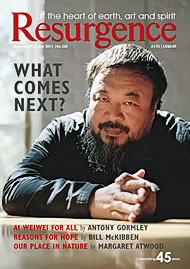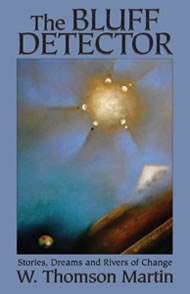If we try to put God in a box we end up excluding some people, animals, plants, microbes, rocks, water, air and cosmos. We bluff ourselves. If we create stories in which God is seen with only a human face, then we tend to exclude faces of people with different coloured skin, different sex, or different rank: We exclude or denigrate other life forms. We exclude nature. Some of our traditional religious stories tell us: “Man is made in the image of God.” Is it not much more likely that such an image was the result of trying to make God in the image of man?
It is important that our human understanding of God be inclusive. An inclusive concept of God changes everything---our worldview, our relationship to nature, our friendship with rocks and trees, our feeling of responsibility for the Earth and the Biosphere. When we become more inclusive in our thinking and caring we become less violent towards people of other cultures, we respect “all our relations” in the natural world, and we are careful not to pollute the soil, water, and air that gives us life. When we become more inclusive in our social relationships we include the sex worker, the poor, and the unemployed in our political responsibilities. When we become more inclusive we begin to understand that people don’t all fit into a two-gender model of society, but we also recognize two-spirit and multi-spirit people.
Many of the stories people have inherited from the traditional religions of the world were created at a time when the world appeared much smaller than we know it today. For example, the” world” where the monotheistic religions were born was what we now recognize as a region. These same religions arose in societies that had become paternalistic in organization. There are those who would have us believe that such stories, such metaphoric myths, are still capable of nurturing healthy and caring societies in today’s world. No doubt there are creative and healthy stories within all of these religious traditions. Now, however, I suggest, it is time to become more discerning about these ancient metaphoric myths and to differentiate the creative myths or memes from the destructive and unhealthy ones. This is where the art and skill of bluff detection becomes critical not only to our survival as a species, but to our future evolution to new beings.
The mythologist, Joseph Campbell, described certain religious stories as “consciously contrived, counterfeit mythologies.” Campbell was good at bluff detection! Such stories need to be placed in the archival files of religions if we are to become more healthy communities and societies. Yet, some of these stories remain as a prime motivating force behind many of the religious and political institutions of today’s world. Too many of our present day religious and political leaders are skilled bluffers. This requires that aware and alert people need to develop the “metaskill” of bluff detection. Bluff detection is about discernment.
Likewise, monotheistic religions and their stories affected the way various professional groups operated in their respective societies where the hierarchical model reigned. Thus, in the medical field, Western medical science became so powerful that it replaced all other ways of knowing. Although each culture has its own science, these were ousted or denigrated by the dominant Western biomedical or allopathic model. Yet, slowly, other ways of knowing are regaining acceptance. The bluff that biomedicine is better than any other health system in all situations is gradually being unmasked.
Healthy stories today are both personal and cosmic. Creative stories enable us to look down a microscope and see through a telescope at one and the same time. We need to learn from our own life stories and our own experiences. We need to recognize God within us and at the same time be aware of the cosmic God in synchronicity with the universe. Psyche and Cosmos are integrally related---moving with the same vibrating particles, rolling on the same waves, connecting to the mystery of all life.
The Bluff Detector is available from www.amazon.com








